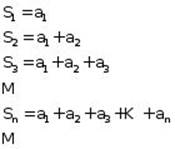University Mathematics Handbook (2015)
VI. Series
Chapter 1. Basic Concepts
1.1 Series of Numbers. Summation of Series
a. Let ![]() be a sequence of numbers.
be a sequence of numbers.
The expression ![]() is called infinite series or just a series, and ak is the general term of the series.
is called infinite series or just a series, and ak is the general term of the series.
The terms of the series add up to partial sums:

The result is a sequence of partial sums ![]() .
.
b. Series ![]() is convergent if there exists a finite limit
is convergent if there exists a finite limit ![]() of the sequence of partial sums
of the sequence of partial sums ![]() .
. ![]() is called the sum of the series. Written
is called the sum of the series. Written ![]() .
.
If the limit of ![]() does not exist, or is infinity, the series is called divergent.
does not exist, or is infinity, the series is called divergent.
c. Examples:
1. Geometric Series ![]()
converges if and only if ![]() and its sum is
and its sum is ![]() .
.
2. Leibniz Series ![]()
3. Series ![]() is divergent.
is divergent.
4. Harmonic Series ![]() .
.
1.2 Series Remainder
The series ![]() is the
is the ![]() -th remainder of the series
-th remainder of the series ![]() ,
, ![]() .
.
1.3 Telescoping Series
a. Let ![]() be a sequence of numbers. Series
be a sequence of numbers. Series ![]() is called telescoping series.
is called telescoping series.
b. A telescoping series is convergent if and only if sequence ![]() is convergent.
is convergent.
c. If sequence ![]() converges to
converges to ![]() , then the sum of the telescoping series is
, then the sum of the telescoping series is ![]() .
.
1.4 Properties of Convergent Series
a. Cauchy's Criterion: Series ![]() converges if and only if
converges if and only if
![]() ,
, ![]() ,
, ![]() ,
, ![]()
![]()
b. Necessary Condition of Convergence
If series ![]() converges, then
converges, then ![]() .
.
This is an insufficient condition: For instance, for harmonic series ![]() , there holds
, there holds ![]() , yet the series is divergent.
, yet the series is divergent.
c. If series ![]() is convergent, then the sequence of remainders
is convergent, then the sequence of remainders ![]() converges to zero. That is, for every
converges to zero. That is, for every ![]() there exists
there exists ![]() such that for all
such that for all ![]() , there holds
, there holds ![]() .
.
1.5 Operation on Series
a. Removing a finite number of terms from a series, or adding a finite number of terms to it, does not affect the convergence or divergence of the series.
Attention: It does change the sum of the series.
b. If ![]() converges to
converges to ![]() , then, for every constant
, then, for every constant ![]() the series
the series ![]() converges to
converges to ![]() .
.
If series ![]() is divergent, then, for all
is divergent, then, for all ![]() , the series
, the series ![]() , is divergent.
, is divergent.
c. If series ![]() ,
, ![]() are convergent, then, the series
are convergent, then, the series ![]() is convergent, and
is convergent, and ![]() .
.